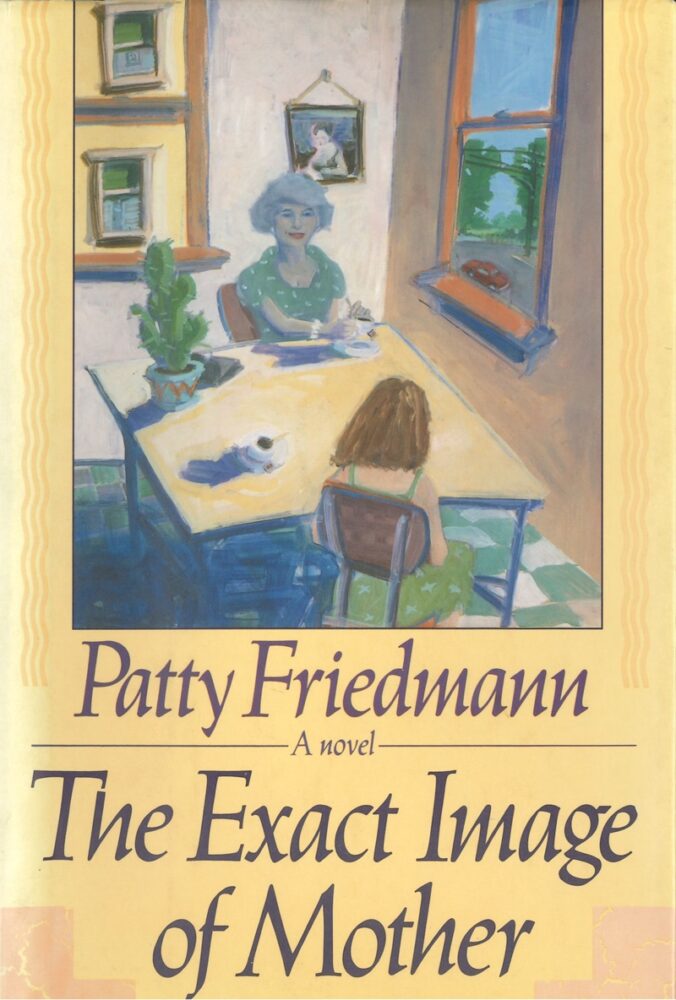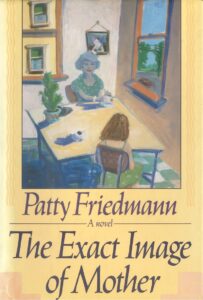Motherhood and Its Malcontents
Patty Friedmann’s The Exact Image of Mother
Published: February 29, 2024
Last Updated: June 1, 2024

Viking Press
Percy, a self-confessed “bad Catholic,” pressed for a return to Judeo-Christian-inflected stories, novels “informed by the tragedy and comedy of real people . . . on a real pilgrimage for good and ill.” The next great writer, he speculated, with more than a dash of misogyny and antisemitism, will be “a Jewish mother . . . a shrewd and self-possessed woman with a sharp eye and a cunning retentive mind who sees the small follies and triumphs and tragedies around her and has her own secret method of rendering it, with an art all her own.”
Percy further prophesized: “It may take a Southern Jewish voice to articulate the fact, increasingly evident, that the modern world is in the grip of demonic powers.”
Percy’s speech was published in a posthumous essay collection in 1991, the same year Patty Friedmann, a Jewish mother from New Orleans, published her first novel. Friedmann’s book, The Exact Image of Mother, is an acidic tragicomedy about the pleasures and pitfalls of parenthood and childhood, seen through the lives of three generations of women. Marmee, helplessly pampered, is sliding into senility; her daughter, the spoiled, unhappily married Letty, is incapable of helping; and Letty’s only child, Darby, whom Letty barely has mothered, passing down to her daughter but a single piece of advice, a facial care tip: “Never use soap.”
If Friedmann’s female characters are difficult, her men are more or less disposable. Darby’s grandfather and father are quickly dispatched within the book’s initial pages. Bitter and pumped full of Thorazine, her grandfather took “such a long time to die,” Darby admits, “that I didn’t feel sorry for him.” Her father asphyxiates himself soon after, on a Caracas-bound cruise, with the help of a plastic Winn-Dixie produce bag. “That was pretty much the way people died in New Orleans, fast or slow, but on purpose,” Darby explains with a shrug. “It was too hot to do anything but wait for it to be over with.”
Darby, likewise, has little room (or patience) in her life for men. She’s thirty-three and works cataloging books at Xavier University’s library, habitually chided by the steel-willed nuns for being young, foolish, and Jewish. Darby fears becoming a young urban failure, or Yuffie, a Friedmann coinage that informed her earlier, 1980s yuppie-skewering satire, Too Smart to Be Rich, with illustrations by Bunny Matthews. On Saturdays, Darby sneaks roast-beef po-boys into the Latter Library, dripping mayonnaise-gravy between the true crime shelves. “I’m alone a lot,” she confides to her only friend. She begins avoiding her grandmother and mother, both of whom are now widowed, finding them embarrassing, and embarrassingly needy. Marmee has to ask what the E stands for on the gas gauge. Letty lines up a nudie photo shoot for a new suitor, her deceased husband’s boss.
“The queer thing about living in the city you grew up in . . . is you don’t have to grow up.”
There’s one hitch: Darby desires a daughter of her own. “I awakened one morning and the whole idea was there, locked into place,” Friedmann writes. “Great masses of once-separate feeling and practicality drifting together . . . I was going to have a baby.” As for a father, Parker Rutledge will do. After spying him at the corner grocery, Darby concocts an elaborate fantasy that’s set—in what is surely one of local literature’s most ludicrous (and raunchiest) sex scenes—in those same aisles, right next to the Hubig’s pie rack.
It’s an imperfect relationship for many reasons, but Darby fulfills her wish—though the Hubig’s hand pie fantasy remains regrettably unfulfilled—and gets pregnant. Letty, perhaps fearing another exact image of her own mother, issues marching orders to the city’s abortion clinic. “I did this on purpose,” Darby says. “Then undo it on purpose,” Letty pleads. A few months later, baby Honor is born, like her mother and grandmother before her, at Touro. “Probably with the same pair of forceps,” Darby jokes.
Like many first novels, The Exact Image of Mother closely traces the contours of the author’s own experiences. “My longest lasting cut-up was choosing to have a child out of wedlock in 1975 when it was decidedly not a Hollywood thing to do,” Friedmann said in a 2011 interview. “It’s forgotten now (the act, not the daughter), but at the time I caught a lot of flak and built a pretty good novel around it.”
The Exact Image of Mother is more than pretty good. It’s just the type of true-to-life pilgrimage story that Walker Percy thought might save humanity, though the sex scenes would surely have given him prudish pause. The novel boosted Friedmann’s career, leading to a series of darkly humorous novels featuring fatherless, thirty- to forty-something-year-old women who, at least to the characters who surround them, appear to lead unfulfilled, unhappy lives—but we know better. Friedmann eventually retitled her first novel Green Eyes—for the color of Honor’s irises—and wrote a prequel and sequel that form the Cooper Family Saga. Her fiction never left New Orleans.
“The queer thing about living in the city you grew up in,” Darby says, “is you don’t have to grow up.” But Darby more than grows up: she becomes the mother she was always meant to be. Honor brings clarity to Darby’s life, pushing all her family drama, work woes, and heartbreak into the background.
Towards the novel’s end, at Letty’s wedding to her second husband, the bride tosses the bouquet, per tradition. It arcs towards Darby, who is cradling her baby daughter in her arms. The flowers land with a poignant, symbolic splash right on Honor’s tummy. It’s what mother would have wanted.
Rien Fertel is the author of four books, most recently Brown Pelican.
